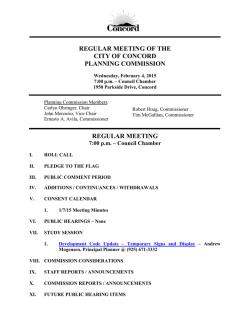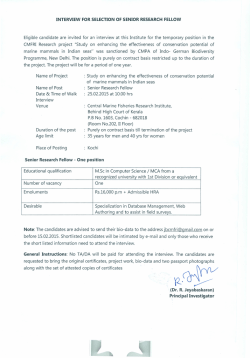
Social approaches to voice hearing a lived experience perspective
Lancaster Academy for Advanced Social Work The Maastricht Interview: Social approaches to voice hearing a lived experience perspective 5th & 6th February 2015 Lancaster Academy for Advanced Social Work Synopsis: The traditional approach to working with voice hearers focusses upon inabilities and deficits, rather than individuals’ inherent ability to understand and cope with their voices and other experiences. This course is grounded on acceptance of lived experiences of voice hearing. Participants will be taught to employ the Maastricht Interview, an assessment tool developed by Dr Sandra Escher and Professor Marius Romme, which provides a structured method for understanding and working with a voice hearer’s experience. Who is it for? This course is designed for professionals who are working in mental health and psychiatric services such as social workers, support workers, nurses, psychiatrists, psychologists and psychotherapists. The course is accessible for people in part or full-time work. It consists of an initial workshop over two consecutive days, followed by an optional one day workshop at a later date. Course facilitators: The course is facilitated by Peter Bullimore and Kate Crawford. Peter Bullimore is a voice hearer who spent ten years as a psychiatric patient enduring many bouts of severe paranoia. Through learning holistic approaches and with support of the Hearing Voices Network he was able to reclaim his life from the system. He facilitates a hearing voices and paranoia support group in Sheffield. He also runs his own training and consultancy agency, Asylum Associates, and is the founder member of the Paranoia Network. Kate Crawford is a voice hearer who facilitates four hearing voices groups and teaches internationally on the topic of hearing voices and its relation to childhood trauma. She now delivers training with Peter Bullimore on how to use the Maastricht Interview for hearing voices. Course details: The course encourages practitioners to explore the experience of voice hearing and build trust, openness and understanding in their work with people who hear voices. It will enable practitioners to: • • • • Assist people to overcome the shame of talking about voices Acknowledge and validate the experience of voice hearing Support people to overcome feelings of shame related to talking about voices Offer space and support to systematically map all aspects of a person’s voices and build insight • • Empower the individual by promoting acceptance and the opportunity to take charge of their experience Support the person to gain a better understanding of why they hear voices During the two day workshop, participants are introduced to the Maastricht Interview, and supported to explore the key features of the approach through group work. All participants interview a voice hearer using the Maastricht Interview, then distil and organise the information, in order to write a report of the voice hearer’s experience. Following this, feedback is provided, and participants are given a second opportunity to apply their learning from the first interview, with a different voice hearer. Finally, participants are supported to develop a construct, or detailed account of the voice hearers' experiences. Developing a construct is the final stage in analysing the relationship between an individual’s voices and their life history. This is done by gaining the answer to two main questions: 1) what do the individual’s voices represent in their lives, and 2) who does the individual’s voices represent? This information will be shared and discussed, then compared with Escher and Romme’s best practice examples. Practitioners attending the three day workshop are expected to apply the approach in their own practice, during which time they can access online tutorials. Participants then attend a final one day workshop, to share anonymised aspects of their experiences, and explore and troubleshoot the practicalities of the model’s use in practice (This third stage is highly recommended, but optional). Qualifications: All participants will gain a CPD certificate for attending the two or three day course. No formal assessment is undertaken. The workshops also form part of an accredited module – ‘Social approaches to voice hearing: a lived experience perspective’ - which involves further exploration and critical analysis of social approaches to voice hearing. This module carries 20 credits which can be used towards a Post-graduate Certificate, Post-graduate Diploma or MA in Advanced Social Work. Additional qualification and assessment information is available upon request. Entry requirements: There are no entry requirements for the non-accredited two or three day CPD course. Applicants who wish to undertake additional accredited work should have at least a lower second class honours degree in social work or a social science subject, a degree level qualification in a related profession, or a Masters degree in Social Work. Social workers taking the accredited course should have practised for at least one year following qualification. Fees: £200 for the two day CPD workshop. Book now: https://online-payments.lancaster-university.co.uk/ £300 for the three day CPD workshop – including online clinical supervision (the third day is recommended, but optional and can be added to the two day course at a subsequent date). The University accredited postgraduate course is £750. Please contact [email protected] for further details on how to apply. For further information on the course contact Dawn via [email protected]
© Copyright 2026

